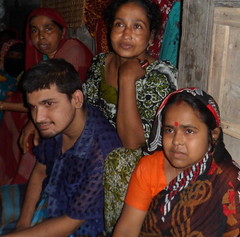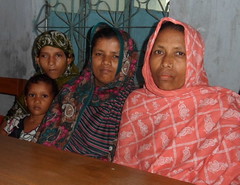I have educated people on multiple sclerosis and the needs of persons with disabilities in the United States, but I learned a lesson in true disability education from rural communities in Bangladesh during my trip to Barisal and Banaripara. As part of BERDO’s community-based rehabilitation program, people with and without disabilities come together to receive microcredit and discuss disability issues. These programs take place outside of Bangladesh’s major cities where loans are often used to purchase a cow or a rickshaw and group discussions focus on integrating people with disabilities into society.
During one of my community visits in Barisal, 25 people crowded into a tiny house to eagerly tell me what they had purchased with their loan or why they had joined the community group. One group member told me that she was not interested in a loan at this time but had joined the group to learn about and discuss disability issues with members of her community. As I looked around the packed room, I got the feeling that the disability education being shared by this group was much more powerful than what could be conveyed by a colorful brochure or a glitzy website. This group really understood what disability education was about and was sharing on a deeper level than I had ever seen in the United States.
I also found myself asking each group about the perception of people with disabilities in Bangladesh. The consensus was that people with disabilities are often seen as a burden to society but that public consciousness is gradually changing. The groups discussed the stigma associated with disabilities and the need to educate parents on the resources available for disabled children. I was also pleased to learn that Bangladesh’s government started providing educational stipends to persons with disabilities in 2007. Although the stipends are small at four to 14 dollars a month, it is a step for Bangladesh towards fulfilling its commitment to the UN Convention on the Rights of Persons with Disabilities and decreasing the high dropout rate of students with disabilities.
Although most developed countries are years ahead of Bangladesh in terms of accessibility and services for persons with disabilities, I was happy to see the progress being made in individual communities towards inclusion of persons with disabilities.
Posted By Amanda Lasik
Posted Jul 16th, 2011



